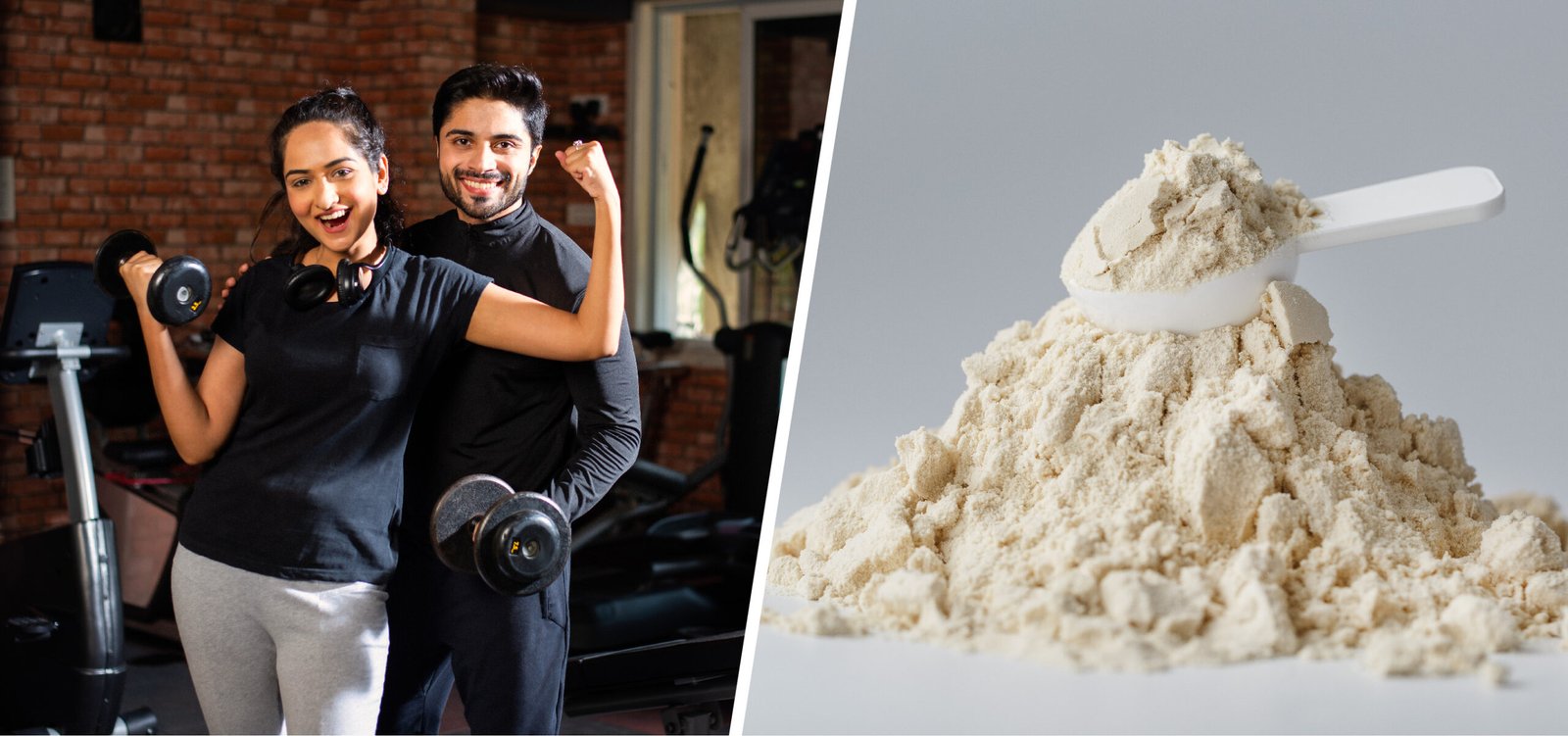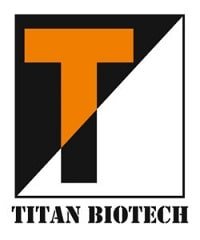Table of Content
- Introduction
- What is Protein?
- Need for Protein After 40 Years of Age
- Factors Increasing Protein Needs
- Key Roles of Protein
- Importance of Protein in the Body
- Benefits of Protein for People Above Age 40
- Why Protein Needs to Be Taken as a Supplement After 40
- Frequently Asked Questions (FAQs)
- References
Introduction
As we age, our body undergoes several biological changes that affect how we build and maintain muscle, metabolize nutrients, and recover from injuries or illness. One of the key nutrients that becomes increasingly important with age—especially after 40—is protein.
This blog explores what protein is, its role in the body, why protein is required after 40, the benefits of adequate protein intake in later years, and why supplements are often necessary.
What is Protein?
Protein is one of the three main nutrients our body needs, along with carbs and fats, to stay healthy and work properly. It is made up of smaller units called amino acids, the “building blocks” of muscle and tissues.
Need for Protein After 40 Years of Age
After the age of 40, we begin to experience a gradual decline in muscle mass, a process known as sarcopenia. This loss accelerates with age and can lead to decreased strength, balance issues, and higher risk of falls.
Factors Increasing Protein Needs
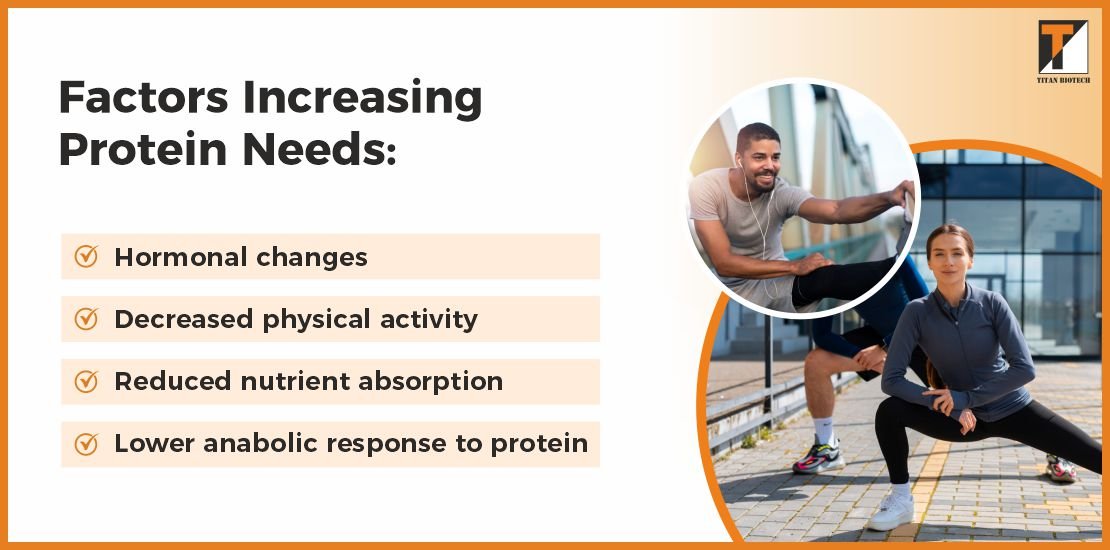
- Hormonal changes
- Decreased physical activity
- Reduced nutrient absorption
- Lower anabolic response to protein
Research shows that the usual recommended 0.8 g of protein per kg of body weight may not be enough for everyone. Experts recommend 1.0–1.2 g/kg/day for healthy older adults, and more for those who are ill or physically active.
Key Roles of Protein
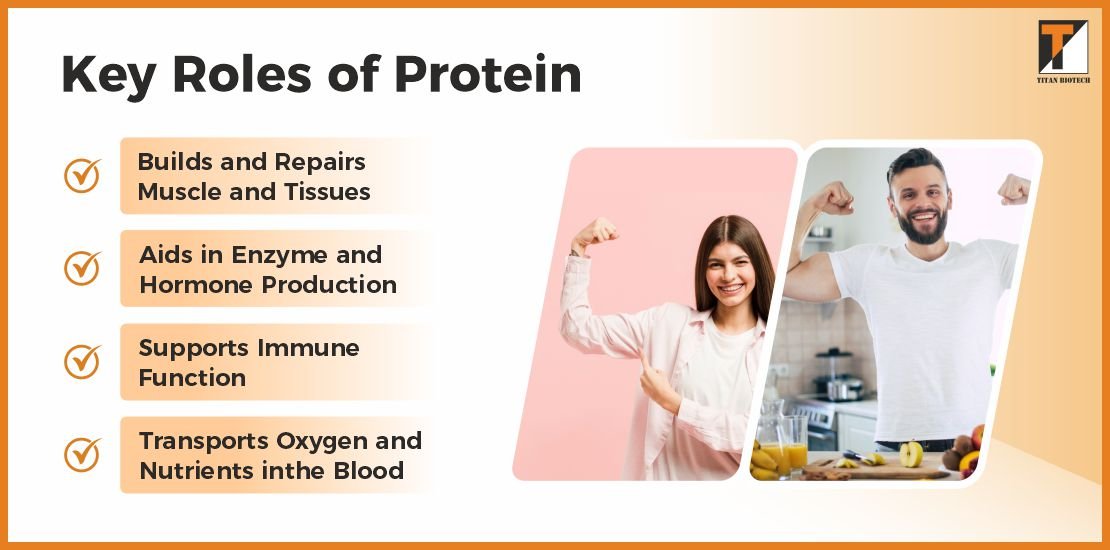
-
Builds and Repairs Muscle and Tissues
Protein provides the essential amino acids required to build, maintain, and repair body tissues—especially muscles. After the age of 40, when muscle breakdown begins to outpace synthesis, this becomes critical. Whether it’s from everyday wear and tear, exercise, injury, or illness, protein helps repair muscle fibres, supports tissue regeneration, and helps preserve lean body mass.
-
Supports Immune Function
Proteins play a key role in forming antibodies, immune cells, and signalling molecules like cytokines. These components help the immune system detect and fight viruses, bacteria, and other pathogens. A deficiency in protein can weaken your immune response, making you more susceptible to infections, especially with age when immune function naturally declines.
-
Aids in Enzyme and Hormone Production
Enzymes are specialized proteins that drive almost all biological reactions in the body—from digesting food to synthesizing DNA. Hormones like insulin, glucagon, thyroid hormones, and growth hormone are also protein-based. These regulate vital processes such as metabolism, blood sugar levels, growth, and reproduction. Without adequate protein, hormonal balance and cellular functions may be compromised.
-
Transports Oxygen and Nutrients in the Blood
Proteins such as haemoglobin (in red blood cells) are essential for carrying oxygen from the lungs to tissues. Other transport proteins like albumin and lipoproteins shuttle nutrients such as vitamins, minerals, and lipids throughout the body. This ensures that cells receive the raw materials they need for energy, repair, and growth.
Importance of Protein in the Body
Protein is vital not only for bodybuilders or athletes but for everyone, especially as they age. It contributes to below mentioned benefits:
- Muscle Maintenance: Reduces Muscle Breakdown and Aids Repair- As we get older, we naturally start to lose muscle, a condition called sarcopenia. Protein plays a crucial role in stimulating muscle protein synthesis and minimizing muscle breakdown, especially after physical activity or illness. Regular protein intake helps maintain strength, supports mobility, and prevents age-related muscle loss, promoting overall physical independence.
- Bone Health: Supports Bone Strength and Density- Protein contributes significantly to bone structure and works synergistically with minerals like calcium and phosphorus to maintain bone density. It helps the body absorb calcium better and boosts growth factors that support bone building. Adequate protein intake is especially important after 40, as bone mass begins to decline, increasing the risk of osteoporosis and fractures.
- Satiety and Metabolism: Keeps You Fuller Longer and Supports Weight Management- Protein is highly satiating compared to carbohydrates and fats. It slows down digestion, curbs appetite, and helps control calorie intake, making it easier to maintain or lose weight. Protein also has a higher thermic effect, so the body burns more calories digesting it, helping support a healthy metabolism and body weight.
- Immune Function: Helps Produce Antibodies and Immune Cells- Protein provides the building blocks for antibodies, cytokines, and immune cells that defend the body against infections. A protein-rich diet helps keep the immune system resilient, especially important in older adults whose immune responses tend to weaken. Without enough protein, your body’s ability to fight off illness and recover from infection diminishes.
Benefits of Protein for People Above Age 40
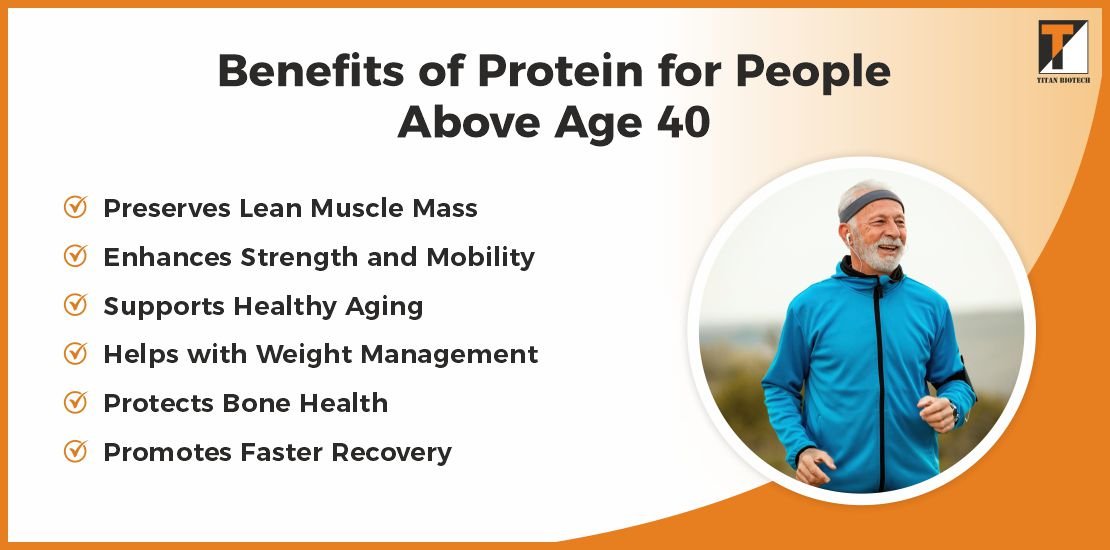
-
Preserves Lean Muscle Mass
Protein helps slow the natural loss of muscle associated with aging.
-
Enhances Strength and Mobility
Higher protein intake combined with resistance training improves physical function and mobility.
-
Supports Healthy Aging
Protein contributes to better recovery, immune support, and overall wellness.
-
Helps with Weight Management
Protein-rich diets increase satiety and prevent muscle loss during weight loss.
-
Protects Bone Health
Contrary to myths, higher protein intake is linked with better bone density, especially when paired with calcium.
-
Promotes Faster Recovery
Aids in healing after surgery, illness, or injury.
Why Protein Needs to Be Taken as a Supplement After 40
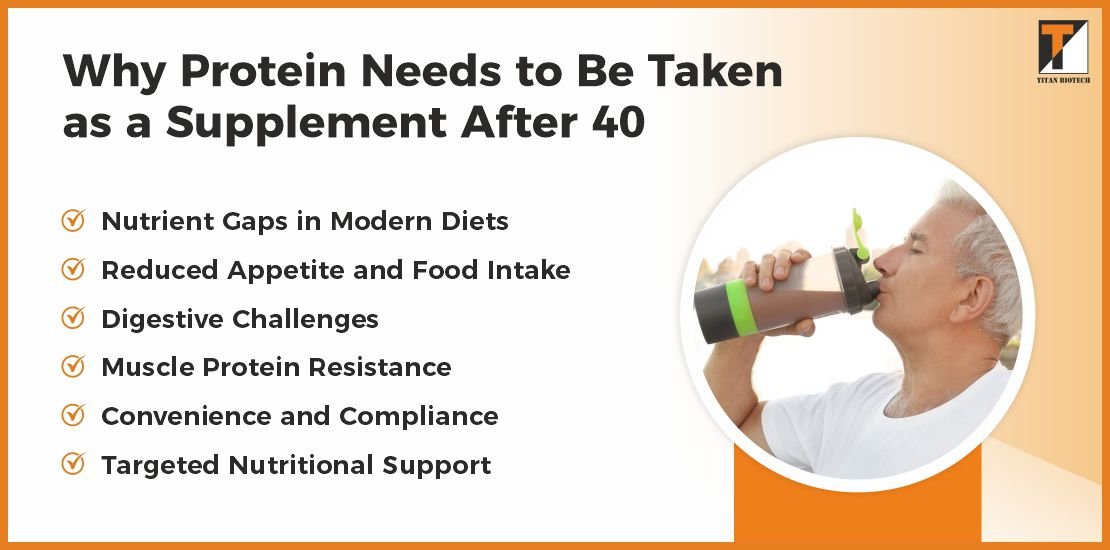
Although it’s best to get protein from whole foods, supplementation becomes important due to following reasons:
-
Nutrient Gaps in Modern Diets
Many adults consume diets rich in carbs and fats but low in quality protein, leading to deficient protein intake.
-
Reduced Appetite and Food Intake
Older adults often eat smaller meals, making it hard to meet protein goals.
-
Digestive Challenges
Conditions like low stomach acid, dental issues, or gastrointestinal problems can hinder protein digestion.
-
Muscle Protein Resistance
Aging muscles require higher protein doses to stimulate growth.
-
Convenience and Compliance
Protein shakes and bars offer an easy, consistent way to ensure adequate intake.
-
Targeted Nutritional Support
Supplements may also provide key nutrients like leucine, vitamin D, and calcium, which are crucial for muscle and bone health.
Frequently Asked Questions (FAQs)
How much protein do I need after 40?
Most adults over 40 need 1.0 to 1.2 grams of protein per kilogram of body weight daily. This can go up depending on physical activity or health conditions.
Can high protein harm my kidneys?
For healthy individuals, increased protein intake does not pose a risk to kidney function. Those with kidney disease should consult a doctor.
What are good sources of protein?
Eggs, dairy, chicken, fish, tofu, lentils, beans, quinoa, nuts, and seeds. Supplements like whey or plant-based powders can also help.
Is it better to get protein from food or supplements?
Whole foods are ideal, but supplements are helpful when dietary intake is insufficient or inconsistent.
Can protein help with weight loss after 40?
Yes, protein promotes fullness, preserves muscle mass, and helps maintain metabolism during weight loss.
What type of protein supplement is best?
Whey protein is quickly absorbed and rich in leucine. Plant-based proteins like pea or soy are good alternatives for vegans or those with dairy intolerance.
References
- https://pmc.ncbi.nlm.nih.gov/articles/PMC6566799/
- https://pmc.ncbi.nlm.nih.gov/articles/PMC5772850/
- https://www.sciencedirect.com/science/article/pii/S2161831322008924
- https://www.health.harvard.edu/staying-healthy/muscle-loss-and-protein-needs-in-older-adults
- https://www.sciencedirect.com/science/article/pii/S1525861013003265
- https://www.clinicalnutritionjournal.com/article/S0261-5614(14)00111-3/fulltext
- https://www.mdpi.com/2072-6643/8/5/295
